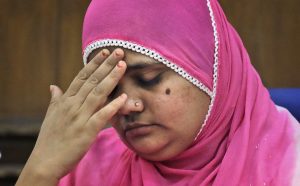On August 15, eleven men who were convicted for the gang-rape of a Muslim woman and the murder of seven members of her family during the 2002 Gujarat riots were released from jail in Godhra. The men, who were serving life sentences, were set free under a remission policy. When they returned to Singvad village in Gujarat’s Dahod, they were greeted, celebrated and garlanded by their families as well as Hindu right-wing groups.
The incident wherein convicted rapists were celebrated is a damning indictment of India’s Hindu-right wing Bharatiya Janata Party (BJP) government. It lays bare the extent of impunity that Hindus accused and convicted of hate-crimes against Muslims enjoy under the Narendra Modi government.
For Bilkis Bano, the survivor of the gang-rape, this is a travesty of justice. “How can justice for any woman end like this? I trusted the highest courts in our land. I trusted the system, and I was learning slowly to live with my trauma,” she said in a statement following her assailants’ release.
“The release of these convicts has taken from me my peace and shaken my faith in justice. My sorrow and my wavering faith is not for myself alone but for every woman who is struggling for justice in courts,” she said.
Bilkis was 21, and five months pregnant, when anti-Muslim violence erupted in Gujarat in 2002. On March 3 that year, Bilkis, her mother, and four other women were raped and brutally assaulted. Out of the group of 17 Muslims who fled a mob attack in their village, eight, including her infant daughter were killed, six went missing.
Only Bilkis, a man, and a three-year-old survived the attack. She remained unconscious for at least three hours after the incident. What made the violence she suffered particularly horrific was the fact that those who raped her were her neighbors. She knew these men. They were dairy suppliers in the village.
Bilkis’ quest for justice has been long and arduous. Over the years that she and her husband struggled to secure their future with a judgment that would rectify the injustice meted out to them; they had to change homes scores of times fearing death threats.
Soon after the incident, Bilkis went to the police station to register a case but was threatened with serious consequences. The police refused to record her rape complaint and closed the case, citing a lack of evidence in 2003. Subsequently, she petitioned the Supreme Court, which ordered the Central Bureau of Investigation to investigate the matter. Since Bilkis and her family members as well as witnesses were being intimidated by the accused, the apex court moved the trial from Gujarat to Maharashtra.
In 2008, 11 of the 19 accused were convicted and awarded life imprisonment for gang-rape and murder of seven members of Bilkis’ family. The verdict was upheld by the Bombay High Court in May 2017. In 2019, the Supreme Court awarded compensation to Bilkis.
Whatever little justice she got from moving India’s courts has now been overturned with the Gujarat government accepting the unanimous recommendation of a local panel that included members linked to the state’s ruling BJP to free the eleven convicts, who served only 15 years of jail time.
Incidentally, Bilkis was neither consulted nor informed about this decision to free the convicts. The decision puts her in an extremely vulnerable position today.
With the 11 convicts walking free, Muslim residents have begun fleeing Dahod and have vowed to stay away until the convicts are jailed again.
The political motivations underlying the Gujarat government’s decision to free the convicted rapists is obvious. Gujarat will vote in state legislative assembly elections in December this year. And stirring communal hatred and polarizing society is Prime Minister Modi’s key strategy to win the elections.
In addition to multiple pieces of anti-Muslim legislation and targeted violence against members of the community, the release of convicts of one of the most high-profile cases that emerged from the 2002 riots is aimed at getting the Hindu votes in the state.
Even as the convicts in the rape and murder cases were let out and celebrated, social activist Teesta Setalvad and former Gujarat Director General of Police R. B. Sreekumar, who had pursued cases against many 2002 rioters were sent to judicial custody.
Setalvad and Sreekumar were slapped with charges of conspiracy, according to an order by the Supreme Court, which said they wanted “to keep the pot boiling for ulterior design” in connection with the Gujarat riots cases.
Twenty years after the Gujarat riots, victims are yet to receive justice. Thousands of Muslims displaced by the violence are yet to return home. Those who carried out the violence continue to roam free or have been freed despite being convicted. Those pursuing justice are being locked up.
Of course, the release of Bilkis’ rapists is not an isolated case of injustice done by the state. In other incidents of rape, be it the Unnao case, Kathua case, or the Hathras case, BJP leaders were found either supporting rapists or covering the damage done by them.
In 2012, when a 23-year-old medical student was gang-raped in a moving bus in India’s capital Delhi, there were mass protests across India calling for the hanging of the rapists. The incident made international headlines.
But today, when the rapists of a Muslim woman, Bilkis Bano, walk free, India is silent. Protests against the decision are few and far between. Even as most Indians go on with their lives, Bilkis’ world is crumbling again.
She has renewed her quest for justice. The Supreme Court will hear her case again in two weeks.
All eyes are now on the apex court. Will it send the convicts back to prison? Or will it allow them to roam free? The latter will undermine the confidence of India’s Muslims in the judiciary.

































